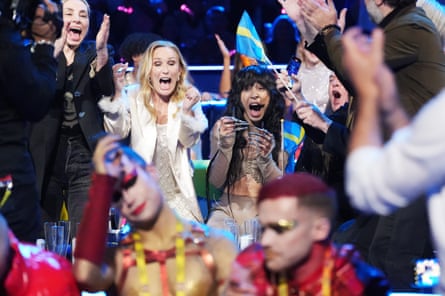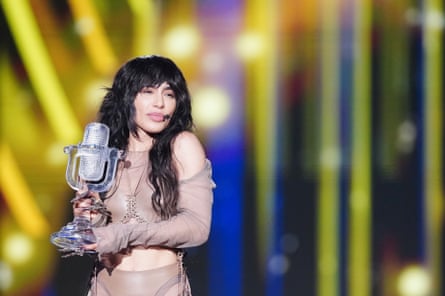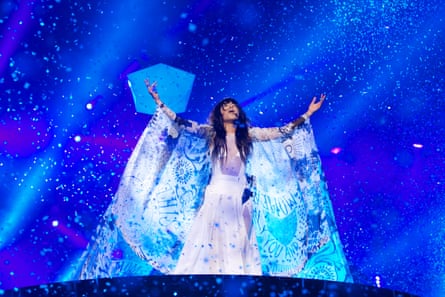I meet Loreen in what I know, from meeting Sam Ryder here last year, is the fleeting habitat of the Eurovision elite – the Langham hotel in central London. Opposite the BBC, it is perfectly placed for the wave of broadcast interviews that ensue, and the ideal environment – subtle luxury in neutral tones – to be totally overwhelmed. The 39-year-old shouldn’t be overawed, though, since she has won before, in 2012, making her the first woman to win twice in the competition’s history.
Loreen’s winning entry for this year, Tattoo, has already been streamed 60m times on Spotify alone and, as I type, it is only Monday. A mere 48 hours after the event, it’s also the ninth most downloaded Eurovision song ever and it will go higher. If you haven’t heard it, it’s a well-executed piece of pop balladeering, with traces of Katy Perry to draw you in before it takes over with its own distinctive brio.
It is my sincere belief, though, that what might seem like overexcitement – Loreen’s energy and verve, huge hand gestures, expressive face and air of delight – aren’t in response to what happened in Liverpool at all. This is just her personality. Jagged fringe, metre-long tiny plaits snaking out of her regular hair like rope, puckish, childlike body language (cross-legged one minute, dancing the next), lovely dimpled face; she keeps beaming at me like an old friend.
Loreen originally said no to being Sweden’s entry for a second time. “I’m a bit purpose-driven, so I thought: ‘What’s my purpose here? What can I give you guys?’ But whenever I said no, there was this dense energy around me.” She looks at the ceiling, shoots her eyes back at me knowingly, and murmurs “spiritual person”, as if she’s telling me a story and footnoting it at the same time. Looking back at the ceiling, she continues, “Universe? Seriously? Is this the way you want me to go?” If she were 5% less self-mocking and vaudeville, it would be annoying; as it is, she is incredibly fun to watch, and that’s before she even starts performing.

She’s been living like an athlete since October, she says, because Tattoo, between the crescendos and the primal, sinewy dancing, was extremely demanding: “I mean, I’m lying in a bed of sand. My nails are made out of stone. There is the sky. There is the mist, there is the wind.” This is all useful clarification, since I did not get that she was communing with the earth. “The only thing I don’t have is water. But then again, I sweat!” Her tone turns serious. “We’ve created a pretty messy world, haven’t we? With all this information? Where do we ground ourselves?” I’m nodding enthusiastically, yes, nails made of stone, that sounds right. She shrugs, grinning. “What can I say, I’m a very spiritual person. I’m a nomad from the Atlas mountains.”
On that: she was born Lorine Zineb Nora Talhaoui in Stockholm and both her parents were first-generation immigrants from Morocco. Her mother arrived in Sweden at 14 with nothing, fleeing an arranged marriage. She met a man and had Loreen, the eldest of six, when she was 16. Loreen hares off briefly to tell me about her great-grandmother: “Her husband got killed in the war, she was beautiful, she was also very young. The family wanted her to remarry. She didn’t want this. So she dressed up as a man, took her two children and fled to Algeria.” At this point Loreen is using her hair to mimic a litham, the face covering of the nomadic men of north Africa. “She raised her children, still dressed up as a man. I have a picture of her with a gold tooth. The women in my family fought really hard to get me to where I’m at.”
Back to Stockholm, 1989: her mother now has six children and is still only 22, and Loreen’s parents split up. “I had to grow up pretty fast,” she says, “because we had to help each other out. We didn’t have any family in Sweden. There are so many things I didn’t understand because I was raised by a child myself. Still, today, I won’t know: is Christmas the 24th or the 23rd?” It was a hard scrabble and the family was very poor. There were upsides, though: “The beautiful thing when you’re raised by a young person is that it’s hard to be judgmental because nobody’s taught you how, you know? ‘That’s wrong’ or ‘that’s right’.”
When Loreen was 13, her mother married again: “He came in with this very weird energy. You’re raised by a single mother, this is a very powerful, determined woman. And then this big, soft, Swedish Santa Claus arrives. My mother was all about surviving. My stepfather was more like, ‘Maybe we should just calm down a little bit. Relax, enjoy the small moments, this connection, here. Everything doesn’t have to be a struggle.’ I think he taught us how to show love.” That was really not the direction I was expecting, from “very weird energy”.
One sibling is an artist, another a surgeon, another works in marketing, another has his own business. She makes a pretty indisputable points about migrants and refugees, grounded in first-hand experience. “You want to have a purpose as a person, you want to feel like you matter. You don’t want to sit around and not do anything. When we have our immigrants coming in to Sweden, we just make them sit there and wait. Let them have a purpose. Let them be a part of this society. This is really important. Otherwise there’s segregation. How do you build up a confidence, where people think, ‘I earned this. I did this’?”

Singing, in the bathroom and in church, was the only way Loreen found any moments to herself as a child. In the melee of five siblings, “it was a sanctuary, something I had for myself.” So when she took her voice to Swedish Idol in 2004, “it was so painful”, she remembers. “Somewhere I knew it was necessary, I guess – I didn’t even know how a microphone worked … I didn’t know what it was like to be judged, singing was so private. But that shock, what came out of it, I realised I needed to understand all of this. As a woman, you have to know your stuff. Otherwise people will come along and say, ‘Darling, we’ll fix this for you, you don’t have to worry.’ I want to be in control.” She’s still very much the self-taught maverick and doesn’t understand why people do vocal arpeggios before they go on stage. “If you were going boxing, you wouldn’t exercise for a couple of hours before,” she says. “Your body would say, ‘Come on, give me a break.’”
In 2005, she released her first single, The Snake, and presented a show on Swedish TV. “I wasn’t that good, I honestly sucked at it.” She then spent a number of years as a segment producer and director for reality TV shows before entering Melodifestivalen in 2011, a song contest almost as old as Eurovision, which determines Sweden’s entry. It does this quite effectively – they have now won seven times, to make them, jointly with Ireland, the contest’s most successful country. “I was shitless scared. But I did it, because I knew it was necessary. If you look at my performance [in Melodifestivalen], I was hiding. This is the subconscious mind: the big dress, the body language, people were like, ‘That’s very artistic’, which it was, but I was hiding. The moment I feel fear, I have to go in. Because I don’t want fear to control my life.”
Loreen was unusual in 2012’s Eurovision, for a few reasons; the song, Euphoria, is pretty good and made the UK charts in its own right, staying there for many weeks after the contest. No shade on this magnificent spectacle, but the winning entries are often pretty kitsch and don’t work out of context. The competition that year was held in Baku, Azerbaijan, and she had a meeting with a local activist group that she had found through Civil Rights Defenders, a Swedish NGO that supports grassroots organisations. Azerbaijan has a history of imprisoning political activists. The country’s government was enraged by Loreen, lodging the familiar complaint, that she had “politicised” Eurovision. Swedish diplomats defended her. “I knew exactly what I was going to do because I believe that there is nothing more important than human life. What did they want me to say? ‘Fuck a human life. People can have misery and struggle – it’s not important because I’m going to sing my bloody song’? How is that even possible?”
Later the same year, she performed in Belarus and met the wife of Ales Bialiatski, the incarcerated pro-democracy activist who went on to win the Nobel Peace prize, while still in detention, 10 years later. “I don’t like the word ‘political’,” Loreen says. “It’s so small – I wish there was a bigger word for it. My people use music as a very powerful tool – you can create movements with it, depending on what type of energy you have. How can that not be political? Look at the Kalush Orchestra,” she says, referring to last year’s Ukrainian Eurovision winners. “This song brought a lot of hope to the Ukrainians.”
She was performing in Ukraine the night before the Russians invaded, and performed in a fundraising gala for Ukraine less than a month later. Explaining her commitment to various causes – she’s also campaigned for girls’ education in Afghanistan, and inalienable children’s rights – she points to her upbringing. “Seeing what I’ve seen in my life, I’ve seen poverty, I’ve seen pain in all different ways. There are good things and bad things about being raised by a single mother.”

To return to the politics of Eurovision, one thing it’s been incredibly good at is establishing international norms around LGBTQ+ visibility: from Paul Oscar, the first openly gay contestant in 1997, to Dana International, the first trans performer, who won in 1998, to Krista Siegfrids kissing her female backing singer on stage in 2013, there has long been a very clear message that nobody was going to hide to spare the feelings of bigots. Turkey, according to its broadcaster, no longer enters Eurovision because of its gay and transgender contestants. And while the Hungarian broadcaster hasn’t said as much openly, Hungary has been absent since 2020, which is coincidentally when Viktor Orbán intensified his open persecution of the LGBTQ+ community, instituting a ban on LGBTQ+ content in schools or kids’ TV the following year. Loreen came out as bisexual in 2017, although “the reason why people know about that”, she says, “is because a newspaper asked me a question, and I answered, ‘Love is where you find it.’ The journalist said, ‘So, you’re bisexual?’ And I said, ‘I guess I am, because love is where you find it. Love is love. It has not much to do with this [gestures towards to her pudenda] so much as this [clasps heart].’ She thinks she might subconsciously have been drawn to Eurovision because of the “acceptance, because I love the values of Eurovision. I love the fact that it doesn’t matter what background you have – as long as you come with love and respect, you’re allowed to be there.”
Loreen is, of course, Sweden’s ultimate darling right now: on Tuesday there was a victory march in her honour. She brought the trophy home in time for the 50th anniversary of Abba’s 1974 win; there are already rumours that the group will perform at next year’s competition. She’s philosophical about the adulation. “You can be a favourite, and then it’ll flip. You’re up, you’re down. I have a ground rule: I don’t want to know what people are saying, I don’t want to know the positive, I don’t want to know the negative. If they say I suck, of course I’m going to care. If they think I’m the greatest, that’s too much pressure. I don’t want to go on that rollercoaster.” Triumph and disaster, adulation and critique, are just the natural rhythm of life, she concludes: “The way it works, daylight, night, we get born and then we die, it’s really hard to dodge that.”
I am not a spiritual person, but I have to say, I like the whole package, from the stone fingernails to the stoic acceptance of death. Our time together has come to an end and she is rushing out to get a cab to soak up more Eurovision glory. “Thanks, you have a nice vibe,” she says. “No, no, no,” I reply. “The nice vibe is all you.”
Loreen’s single Tattoo is out now.
Stay connected with us on social media platform for instant update click here to join our Twitter, & Facebook
We are now on Telegram. Click here to join our channel (@TechiUpdate) and stay updated with the latest Technology headlines.
For all the latest Music News Click Here
